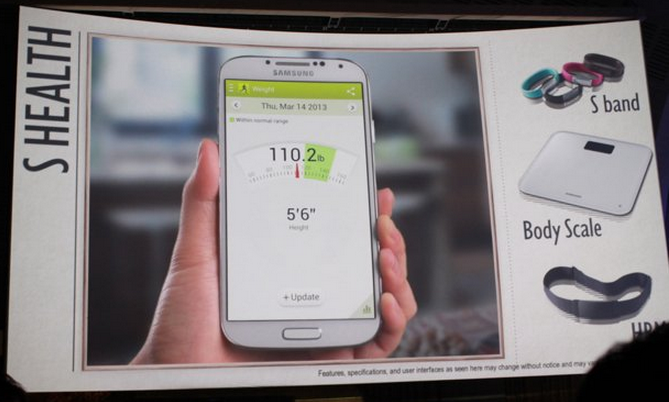Editor’s Note: Dan Munro is a contributing editor to Forbes. His columns are collected under the heading, “The HealthCare Compass.
Update: Photo from Business Insider reviewer at the Samsung launch event:
Editor’s Note: Dan Munro is a contributing editor to Forbes. His columns are collected under the heading, “The HealthCare Compass.
Update: Photo from Business Insider reviewer at the Samsung launch event:
Earlier this evening, Samsung released the latest model of their Galaxy smartphone the S 4. The previous model – the S 3 – remains the largest selling Android-based smartphone with over 40 million units sold.
There’s a more complete review at Gizmodo here. Normally, I wouldn’t care that much because I’m not that hardware-focused and because the device doesn’t appear to be all that revolutionary. The review is generally positive – but not glowing – and I tend to subscribe to the now famous Marc Andreessen view that software – not hardware – is “eating the world.”
But here’s where I did think it warranted more coverage – and specifically healthcare attention. There’s not a lot of detail (let alone actual review), but unlike other smartphones, this one comes included with health sensors that are seamlessly integrated with a built-in “app” called S-Health.
From the Gizmodo review:
S Health: Holy crap, Samsung put a health tracker in its phone! Which is actually a great idea. S Health is an app that will track your steps, stairs climbed, and the ambient temperature and humidity, plus track your food intake and estimate calories consumed/burned. You can even track sleep with an optional accessory (see below). Fitbit and co. should be nervous, although I’m curious to see what kind of ding this puts on your battery life.
… and then a bit further on in the same review:
There are also a bevy of accessories that complement the S Health app. There’s a wristband you can wear independently of the phone (in case you prefer running with out it), which will track your steps and monitor the quality of your sleep. It will then sync wirelessly with the app. There’s also a connected scale and heart rate monitor. Again, this isn’t good news for smaller fitness tracking companies.
As best as I can tell, this makes Samsung the first manufacturer to fully embrace the integrated value of health sensors and applications – in a single smartphone device – with accessories that are supportive and not stand-alone or separate. Regardless of how well it works, I’m just impressed that a global smartphone manufacturer has finally begun to fully embrace this truly critical aspect of our connected life – our healthcare.
It’s really just another positive step and leading indicator in the evolution of technology and connected healthcare. I’m reserving actual applause until there’s more detail, but I do like the intriguing potential this has to engage consumers even more seamlessly with their healthcare life. At least for those of us living here in the U.S., it may not be all that long before the release schedule for new smartphones will need to include an FDA approval process. Let’s just hope we can find a way to make that process more seamless too.








